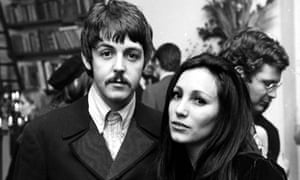Half-teasing, the Observer Magazine introduced readers to a Californian singer in 1964 calling her “the girl with sleepy eyes and the guitar”, who, it said, was pushing Beat music out of the hit parade for good.
That “girl” was the 26-year-old Julie Felix, and she never really returned to her native Santa Barbara, staying to make both her home and her name in Britain. Throughout the 1960s and 1970s she was a symbol of the blossoming hippie scene and its more traditional sound, welcomed into the heart of Swinging London and appearing regularly on television with the satirist David Frost before hosting her own television show, Once More with Felix, on BBC Two from 1967 to 1970.
“I was a beatnik, a pre-hippie,” said Felix this weekend. “I’d been travelling around like a kind of On the Road thing, inspired by Jack Kerouac.”
Before her 80th birthday next month, the singer looked back at the Observer article with amusement as she prepared for a celebratory London concert at the Charing Cross Theatre in central London.
“I wasn’t as pure as they thought,” she said. “Decca [her record label] wanted me to have that image but I didn’t want it – although I never wore makeup.” In 1968, she was arrested at Heathrow airport for possession of drugs.
The folk scene was also not as fresh to London as Michael Braun’s article in this newspaper implied: “There was already a real buzz about the songs of Bob Dylan, who had earlier come to England and taken traditional British themes as the inspiration for many of his songs, like Girl from the North Country,” said Felix, whose biggest hit remains the South American song El Cóndor Pasa, or If I Could, also recorded by Simon and Garfunkel.

Yet to many ears American folk was an alien sound. “These wandering minstrels sing what have come to be known as ‘folk songs’,” explained Braun, adding: “Even now thousands of people throughout Britain attend weekly ‘folk nights’ in pubs, clubs and coffee-houses across the land.”
For Felix the atmosphere at such clubs, like The Troubadour in Earls Court, was “exciting and inspirational”. “Mr Braun misses this and makes fun of the emerging folk movement. Seeds were being sown for the singer/songwriter era. And there was a revival of traditional songs, like those sung by The Dubliners.”
Life “has unfolded according to fate rather than plan”, Felix said. She had no early ambition to sing but instead trained in theatre, then left California to see Europe. “I felt I was sheltered from life’s experiences. I had been singing at a Hollywood coffee house called the Unicorn and I would have stayed there if I had really wanted to sing for a living.”
So she set off for the Mediterranean, arriving on the bohemian Greek island of Hydra in the early 1960s. “It was full of creative and eccentric people,” she said. “There was a young poet from Canada there whose name was Leonard Cohen. He used to borrow my guitar and sing union songs because he wasn’t really writing songs back then. I would sing in bars for free drinks.”
Felix’s friendship with Cohen lasted a lifetime. They sang together and he appeared on her TV show. “Years would go by but we were always talking and emailing. Leonard had a way of choosing his words so carefully. He was never afraid to go to deep, dark places and that’s why people liked him, without even knowing that was what they liked.”
She was in Mexico when she heard of Cohen’s death two years ago. “I knew he was ill but I didn’t expect him to go. I received so many requests to speak and sing in tribute to him all over the world. I was in a kind of dream but what amazed me was how personally everyone took it. People felt they knew him.”
More than 50 years ago, after a period singing Mexican songs in hotels and bars across Germany, Spain and France, Felix made it to England. “Fate whisked me along. A clothes designer friend invited me to London, so I stayed in her flat.”

Decca offered her a contract after hearing a tape and a chance encounter with Frost in the lift of her block of flats led to a meeting with the television producer planning The Frost Report. “Everyone knew who David was, and if you didn’t, he would tell you. He said he was planning a live show and asked if I could sing songs on different themes.”
Her own show on David Attenborough’s fledgling BBC Two came next and a string of extraordinary names made guest appearances, from Dusty Springfield and Peter Cook to the Four Tops, the keyboard player Billy Preston, the Kinks and Spike Milligan. Singer Tim Buckley also made a rare screen appearance. Sadly few tapes of the shows survive.
“My show was the first series made in colour so I was given one of only 22 colour sets in the whole country. My flat was absolutely packed when they showed The Beatles’ Magical Mystery Tour on television.”
Once More with Felix was recorded live at Shepherds Bush Theatre but its young star was too naive to feel scared. Sudden fame did come as a shock however. “It was weird because people would stare at me and I would wonder if I looked funny. I liked being anonymous when I went back to LA.”
Felix was arrested at Heathrow airport for possession of drugs in 1968. “That was bad news. It was clear I wasn’t so innocent then. But I wasn’t taken off air, which I thought I might be. I went to court and John Mortimer defended me. He said, ‘Show her mercy!’ He was magnificent.”
The folk revival of recent years has meant more bookings for Felix, including the New Forest folk festival in July. “I so appreciate that I can just get up and sing,” she said, “although my voice is a little lower now.”